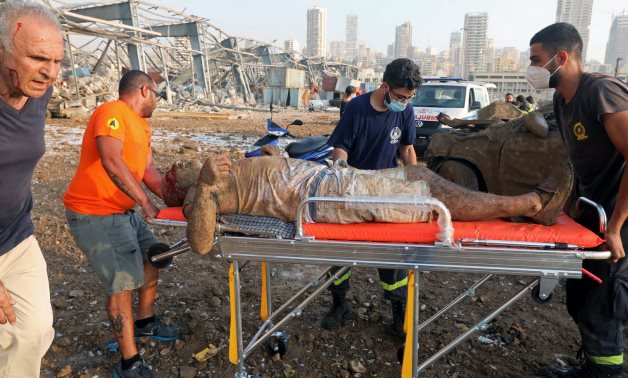
An injured man who was pinned under a vehicle following an explosion in Beirut's port area, is transported on a stretcher to hospital, in Beirut, Lebanon, August 4, 2020. REUTERS/Mohamed Azakir
CAIRO – 19 August 2024: On World Humanitarian Day, the World Health Organization (WHO) stands united in honoring the extraordinary dedication of humanitarian workers. These heroes face the harshest conditions, carrying the torch of hope and shouldering the noble mission of delivering relief and essential services to millions in need across the Eastern Mediterranean and around the globe.
This day is more than just a fleeting occasion; it’s a moment of reflection and a call to collective responsibility. It reminds us to protect those who have dedicated their lives to serving others, often putting themselves at significant risk.
The theme for this year’s World Humanitarian Day, "Working for Humanity," serves as a poignant reminder of the dangers faced by humanitarian workers. In 2023, more humanitarian workers lost their lives than in any previous year, despite the international laws in place for 75 years to protect civilians and aid workers during conflicts.
The situation in 2024 is on track to be even worse, with ongoing escalations in the Occupied Palestinian Territories, Sudan, Syria, Lebanon, and Yemen.
The WHO expressed deep concern that the Eastern Mediterranean region continues to suffer from numerous ongoing emergencies, leaving over 100 million people in urgent need of humanitarian aid, including health services. In these perilous environments, the courage and self-sacrifice of humanitarian workers shine like a beacon in the darkness.
The organization expressed profound sorrow for the loss of colleagues who died in the line of duty. Today, WHO dedicates a moment of respect and honor to the memory of three exceptional members of the WHO family who tragically lost their lives.
Dima Abdul Latif Mohamed Al-Haj (27), a patient care officer at the Limb Reconstruction Center in Gaza, perished when her parents' home, where she sought refuge, was bombed. Her husband, six-month-old child, and two brothers also died in the senseless act of violence. Dima had dedicated her young life to helping others.
Emad Shihab (42), an engineer who lost his life in Deir ez-Zor, Syria, during an airstrike. His important work in water, sanitation, and hygiene (WASH) was crucial in ensuring the safe operation of health facilities, particularly during renovations at Al-Assad General Hospital.
Nusrat Abdi Hassan (27), a public health officer in Somalia, was killed in a tragic attack in Mogadishu while taking a break from her exhausting life-saving work.
The ongoing mourning in Gaza is particularly heartbreaking, where since October 2023, 287 humanitarian workers have lost their lives, including 205 UNRWA staff members. Their deaths are not only a devastating loss for their families and colleagues but also a crushing blow to the communities they served and the broader humanitarian cause.
The WHO also called attention to the 17 UN colleagues and many others from national and international NGOs, diplomatic missions, and civil society who remain arbitrarily detained in Yemen.
Among them are 13 UN staff members detained by the Houthi authorities in June 2024 across several Yemeni provinces, as well as four UN employees held since 2021. WHO demands their immediate and unconditional release and calls for unimpeded access to humanitarian aid for those in need.
The statistics from 2023 were horrifying, with 935 attacks on health facilities across the Eastern Mediterranean, resulting in 669 deaths and 1,054 injuries among healthcare workers. The situation shows no signs of improvement, with 433 attacks recorded in the first eight months of 2024 alone, leading to 286 deaths and 322 injuries.
These are not just numbers; they represent real lives lost, families torn apart, and communities deprived of essential care. WHO stressed the urgent need to end violence against those providing life-saving services.
Intentional attacks on health facilities, workers, and patients are not only violations of international law but also blatant assaults on the sanctity of health. These actions undermine the core of humanitarian work and violate the fundamental principles of humanity, neutrality, integrity, and independence that guide our efforts.
On World Humanitarian Day, WHO calls on the international community to take decisive action to end these violations. International justice must address the impunity that encourages the continuation of such crimes.
WHO extends its deepest gratitude to all humanitarian workers in the Eastern Mediterranean and beyond. Your courage, commitment, and humanity are the lifeblood of humanitarian work.
Despite the dangers, you continue to provide life-saving services, demonstrating the resilience and strength of the human spirit. WHO honors and values your contributions today and every day.
Comments
Leave a Comment